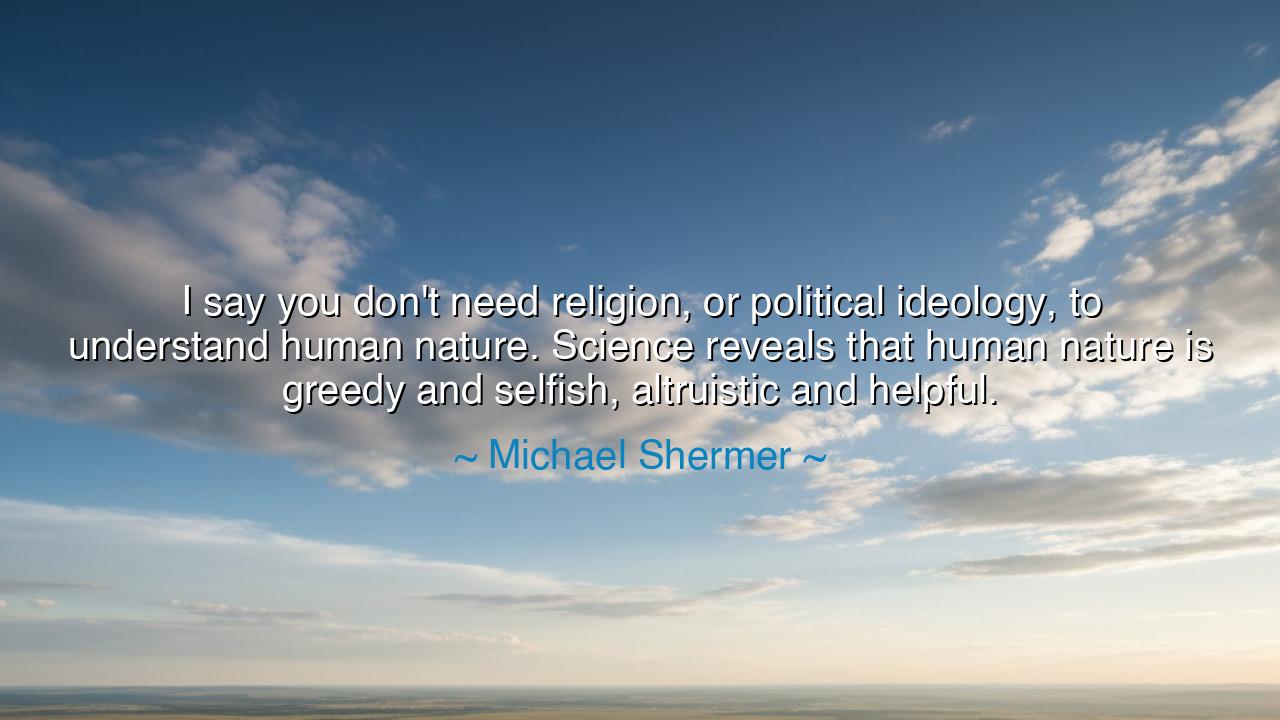
I say you don't need religion, or political ideology, to
I say you don't need religion, or political ideology, to understand human nature. Science reveals that human nature is greedy and selfish, altruistic and helpful.






"I say you don't need religion, or political ideology, to understand human nature. Science reveals that human nature is greedy and selfish, altruistic and helpful." These words from Michael Shermer call upon us to look at the essence of human nature not through the lenses of religion or political ideologies, but through the lens of science—an objective, rational approach to understanding the complexities of human behavior. In this statement, Shermer invites us to recognize that the deepest truths about who we are as humans are revealed not only by our religious doctrines or political systems, but by the careful study of human behavior itself. Science, Shermer argues, uncovers both the greedy, selfish tendencies and the altruistic, helpful capacities that lie within each of us. It is not simply a matter of belief or ideology but a matter of observing, understanding, and accepting the dual nature of human beings.
In the ancient world, thinkers such as Socrates, Plato, and Aristotle grappled with similar questions about human nature. Socrates believed that understanding the soul was essential to understanding human behavior. He sought to examine the moral fabric of humanity through dialogue and questioning. Plato, in his works, depicted humans as beings caught between the ideal and the imperfect, their behavior shaped by both reason and desire. Aristotle, on the other hand, saw humans as political animals, defined by their social nature, capable of both virtue and vice. These thinkers sought to explain human nature through a blend of reasoning, philosophy, and ethical reflection. Yet, they did not have the benefit of science as we do today, which allows us to analyze human behavior through a more empirical, evidence-based approach.
The science that Shermer refers to is not just a tool for understanding the external world but also for understanding the inner world of the human heart and mind. Through psychology, sociology, and evolutionary biology, we have learned much about the contradictions within human nature—the self-interest that often drives us, as well as the capacity for compassion that motivates acts of kindness. One of the most striking findings in psychology is the bystander effect, where individuals are less likely to help someone in need when others are present. This illustrates the selfishness that often emerges in group settings, where personal responsibility is diffused. However, science also reveals the opposite, such as the study of empathy and altruism in humans. Studies have shown that humans are biologically wired to help others, particularly when they feel a sense of connection or shared humanity.
Consider the example of Mahatma Gandhi, whose life embodies the altruistic nature of humanity. Gandhi's commitment to non-violence and social justice came from a deeply rooted belief in the goodness of humanity, yet his actions were also guided by a scientific understanding of social dynamics. His non-violent civil disobedience aimed not just at moral ideals but at recognizing the potential for social change through collective human behavior. Gandhi’s fight for Indian independence was rooted in both moral philosophy and an understanding of how people could be mobilized for a common cause. His legacy demonstrates that while human nature can be selfish and driven by personal interests, it can also be guided by altruistic motives when people understand the shared nature of their struggles.
Yet, Shermer’s insight reminds us that religion and political ideologies are often tools—powerful, but imperfect and sometimes distorting—the way we understand human behavior. Religion, while it often encourages selflessness, can also be manipulated to serve the interests of the few, as can political ideologies. History is filled with examples of how religious and political ideologies have been used to justify wars, oppression, and exploitation. The crusades, the Inquisition, and the colonization of indigenous peoples were driven by religious ideologies that claimed moral authority over others. Similarly, political ideologies have often promised to improve the human condition but have, at times, resulted in oppression and violence. Both religion and politics can reveal the best of humanity, but they can also bring out the worst.
The lesson here is profound: human nature is complex, multifaceted, and cannot be fully understood through a single lens, whether it be religious or political. Science, as Shermer suggests, reveals that we are not defined by any one trait. We are capable of both greed and selfishness, but also altruism and compassion. Understanding these complexities allows us to make informed choices in our actions and our interactions with others. Instead of relying solely on religious or political systems to understand ourselves, we must also embrace the wisdom of science—to look at human nature as it truly is, with all its contradictions, and to use this knowledge to guide us toward a more equitable and just society.
In our own lives, we must reflect on Shermer’s words and seek to understand the dual nature of our own behavior. We must recognize that we have both the capacity for good and the tendency for self-interest. By studying the science of human behavior, we can better understand our motivations and choices, striving to act with compassion and empathy while recognizing the parts of us that seek self-gratification. Let us live with awareness, using both our hearts and our minds to understand the complexity of the human experience and to contribute to a world where the best of our nature can flourish.






AAdministratorAdministrator
Welcome, honored guests. Please leave a comment, we will respond soon